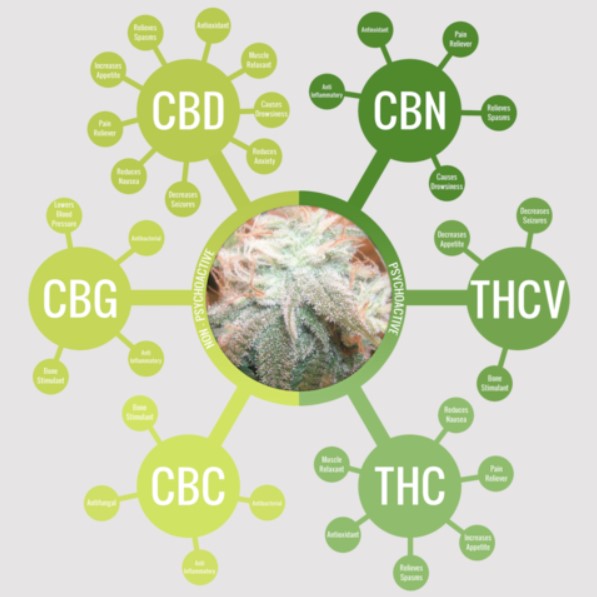Learn all about cannabinoids, the active compounds found in the cannabis plant. Discover their potential health benefits, effects, and legality.
Cannabis has been used for medicinal and recreational purposes for thousands of years. However, it wasn’t until the last few decades that scientists began to understand the unique compounds found in the plant. These compounds are called cannabinoids, and they are responsible for many of the effects associated with cannabis consumption.
In this article, we’ll take a closer look at what cannabinoids are, how they work, and what potential benefits they may offer. We’ll also explore the different types of cannabinoids and their legal status.
What are Cannabinoids?
Cannabinoids are a group of chemical compounds found in the cannabis plant. They interact with the body’s endocannabinoid system, which plays a crucial role in regulating various bodily functions, such as appetite, mood, sleep, and pain perception.
There are over 100 different cannabinoids found in cannabis, each with its own unique properties and effects. However, two of the most well-known and studied cannabinoids are THC and CBD.
THC (tetrahydrocannabinol) is the primary psychoactive compound in cannabis. It is responsible for the “high” associated with cannabis consumption. CBD (cannabidiol), on the other hand, is non-psychoactive and is believed to have a variety of potential health benefits.
How do Cannabinoids Work?
Cannabinoids interact with the body’s endocannabinoid system (ECS), a complex network of receptors and neurotransmitters located throughout the body. The ECS helps regulate many physiological processes, including appetite, mood, sleep, pain, and immune function.
When you consume cannabis, the cannabinoids bind to these receptors, activating various biological pathways. THC, for example, binds to CB1 receptors in the brain, which can result in the euphoric “high” associated with cannabis consumption. CBD, on the other hand, does not bind to these receptors but instead interacts with other receptors in the body, such as serotonin and GABA receptors.
Types of Cannabinoids:
As mentioned earlier, there are over 100 different cannabinoids found in cannabis. However, the most well-known and studied cannabinoids are THC and CBD. Here are some other cannabinoids that are gaining attention:
CBG (cannabigerol) – Non-psychoactive and may have potential anti-inflammatory properties. CBN (cannabinol) – May have potential sedative effects and could help with sleep. CBC (cannabichromene) – May have potential anti-inflammatory and anti-depressant effects. THCV (tetrahydrocannabivarin) – May have potential appetite suppressant and anti-convulsant effects.
Legal Status of Cannabinoids:
The legal status of cannabinoids varies depending on the country and jurisdiction. In the United States, cannabis is classified as a Schedule I substance, which means it is considered to have a high potential for abuse and no accepted medical use. However, some states have legalized cannabis for medicinal and/or recreational use.
CBD, on the other hand, is legal at the federal level as long as it is derived from hemp plants with less than 0.3% THC. However, some states have stricter laws regarding CBD, so it’s important to check your local laws before purchasing or using CBD products.
FAQs:
Q: Do all cannabis strains contain cannabinoids?
A: Yes, all cannabis strains contain cannabinoids, but the amount and type of cannabinoids can vary depending on the strain.
Q: Are cannabinoids addictive?
A: While cannabinoids are not considered to be physically addictive, some people may develop a psychological dependence on cannabis.
Q: Can cannabinoids be used for medicinal purposes?
A: Yes, cannabinoids have been studied for their potential medicinal properties, including pain relief, anti-inflammatory effects, and anti-anxiety effects.
Q: Are there any potential side effects of consuming cannabinoids?
A: Yes, consuming cannabinoids can have potential side effects, such as dry mouth, dizziness, and impaired coordination. Additionally, THC can cause short-term memory impairment and can affect driving ability.
Q: Can I get high from consuming CBD?
A: No, CBD is non-psychoactive and will not produce a “high” like THC.
Conclusion:
Cannabinoids are the active compounds found in the cannabis plant that interact with the body’s endocannabinoid system. There are over 100 different cannabinoids found in cannabis, each with its own unique properties and effects. While THC is the primary psychoactive compound in cannabis, CBD has gained attention for its potential health benefits.
Cannabinoids have been studied for their potential medicinal properties, but it’s important to understand the potential risks and side effects associated with cannabis consumption. Additionally, the legal status of cannabinoids varies depending on the country and jurisdiction, so it’s important to check your local laws before purchasing or using cannabis products.
Overall, a better understanding of cannabinoids and their effects can help individuals make informed decisions about cannabis consumption and its potential impact on their health and well-being.


0 Comments